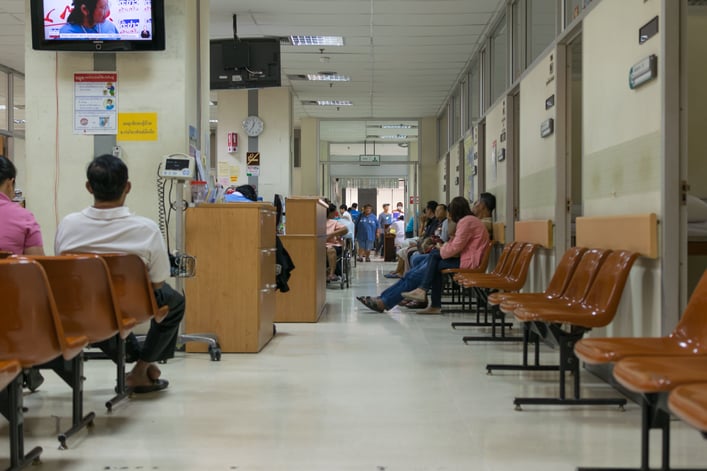International health insurance

Most commonly purchased by expats, this type of insurance covers treatment in both private and government hospitals in Thailand and internationally. Depending on the plan, the list of countries you can be treated in will vary. For example, many international plans provide cover in all countries throughout Asia. However, some plans will cover all Asian cities and countries with the exception of Singapore and Hong Kong. As for outside of Asia, cover can vary dramatically. While there are plans that do offer worldwide coverage in every single country on earth, many will exclude the US due to the expensive medical system. So how much do international policies cost? The general rule is, the more countries a policy covers, the higher your premium.
A common mistake many expats make is to assume they don’t need any coverage. They believe their home country’s health insurance covers them in Thailand. For example, a French or British person may be under the impression their country’s government policy covers them here. Or an American may assume their private insurance coverage extends to Asia.
Government insurance from a foreign country is typically not accepted in Thailand, and hospitals have the right to turn away anyone that does not have proper coverage. Whether you have government or private insurance from back home, we recommend calling your provider to see if you’re covered in Asia. If you’re not, LUMA offers a variety of international health insurance plans to provide you maximum protection and the option to choose the countries where you’d like to schedule planned treatments. What’s more, all policies provide worldwide emergency coverage.
Private insurance

Often provided by employers, private insurance can cover both Thai nationals and expats. In Thailand, the private insurance system is similar to that of other countries. An employer can take out a group insurance policy and his or her employees will receive coverage at the hospital of the staff member’s choice, either private or government. Coverage for treatment varies according to the policy. Some plans will cap your limits while others have very high fixed limits that cover almost everything. If an expat or Thai national does not receive coverage through their employer, they can also take a private insurance policy as an individual.
Government health care
Available to Thai nationals and expats, every person who works for a licensed Thai company receives social security. With this, a person is typically assigned to a few specific government hospitals where they can receive treatment. Because the choices are all government hospitals, the person will have to queue for treatment—unless it’s an emergency. So, this raises an interesting question. As social security only covers those who work at a licensed company, what do all the informal workers do? How do Thailand’s many street vendors receive health care?

To take care of their people, the government offers all Thai nationals public health care through their 30 baht protection policy. If an informal worker needs treatment, he or she can pay 30 baht at a hospital to get the care they need—whether for a common cold or a broken bone.
Civil servant insurance

If you work for the Thai government, you can qualify for Civil servant insurance. While civil servants typically earn a low salary, they qualify for a specific type of official government medical insurance that covers them, as well as first degree relatives and parents. With this insurance, the civil servant and their covered family members can get fast track treatment at any government hospital in Thailand.
Though this list is not comprehensive, the above are some of the most typical types of insurance available in Thailand. If you’re looking for coverage, don’t hesitate to get in touch with LUMA’s experts. We are happy to consult you on the ideal health insurance plan that can protect you or your family. Contact us today at consult@lumahealth.com to find your perfect policy.

.png)

